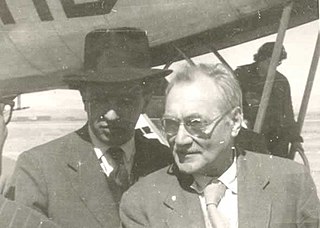A Quote by R. Buckminster Fuller
Initiative can neither be created nor delegated. It can only spring from the self-determining individual, who decides that the wisdom of others is not always better than his own.
Related Quotes
Man—every man—is an end in himself, not a means to the ends of others; he must live for his own sake, neither sacrificing himself to others nor sacrificing others to himself; he must work for his rational self-interest, with the achievement of his own happiness as the highest moral purpose of his life.
The autonomous individual, striving to realize himself and prove his worth, has created all that is great in literature, art, music, science and technology. The autonomous individual, also, when he can neither realize himself nor justify his existence by his own efforts, is a breeding call of frustration, and the seed of the convulsions which shake our world to its foundations.
Where there is Love and Wisdom, there is neither Fear nor Ignorance.
Where there is Patience and Humility, there is neither Anger nor Annoyance.
Where there is Poverty and Joy, there is neither Cupidity nor Avarice.
Where there is Peace and Contemplation, there is neither Care nor Restlessness.
Where there is the Fear of God to guard the dwelling, there no enemy can enter.
Where there is Mercy and Prudence, there is neither Excess nor Harshness.
Jnana is given neither from outside nor from another person. It can be realised by each and everyone in his own Heart. The jnana Guru of everyone is only the Supreme Self that is always revealing its own truth in every Heart through the being-conciousness 'I am, I am.' The granting of true knowledge by him is initiation into jnana. The grace of the Guru is only that Self-awareness that is one's own true nature. It is the inner conciousness by which he is unceasingly revealing his existence. This divine upadesa is always going on naturally in everyone.
Liberty, according to my metaphysics, is an intellectual quality, an attribute that belongs not to fate nor chance. Neither possesses it, neither is capable of it. There is nothing moral or immoral in the idea of it. The definition of it is a self-determining power in an intellectual agent. It implies thought and choice and power; it can elect between objects, indifferent in point of morality, neither morally good nor morally evil.
Neither fear nor self-interest can convert the soul. They may change the appearance, perhaps even the conduct, but never the object of supreme desire... Fear is the motive which constrains the slave; greed binds the selfish man, by which he is tempted when he is drawn away by his own lust and enticed (James 1:14). But neither fear nor self-interest is undefiled, nor can they convert the soul. Only charity can convert the soul, freeing it from unworthy motives.
Humility is just as much the opposite of self-abasement as it is of self-exaltation. To be humble is not to make comparisons. Secure in its reality, the self is neither better nor worse, bigger nor smaller, than anything else in the universe. It is ? is nothing, yet at the same time one with everything. It is in this sense that humility is absolute self-effacement.
A man cannot free himself by any self-denying ordinances, neither by water nor potatoes, nor by violent possibilities, by refusing to swear, refusing to pay taxes, by going to jail, or by taking another man's crops or squatting on his land. By none of these ways can he free himself; no, nor by paying his debts with money; only by obedience to his own genius.
WISDOM IS dependent upon knowledge. Where there is complete ignorance there can be no wisdom, no knowledge of the right thing to do. Man’s knowledge is comparatively limited and so his wisdom must be small, unless he can connect his mind with a knowledge greater than his own and draw from it, by inspiration, the wisdom that his own limitations deny him. Only God knows all truth; therefore only God can have Real wisdom or know the right thing to do at all times, and man can receive wisdom from God. Wisdom is obtained by reading the mind of God.
Greater in battle
than the man who would conquer
a thousand-thousand men,
is he who would conquer
just one —
himself.
Better to conquer yourself
than others.
When you've trained yourself,
living in constant self-control,
neither a deva nor gandhabba,
nor a Mara banded with Brahmas,
could turn that triumph
back into defeat.




































